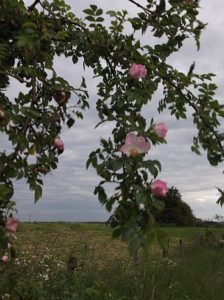As it’s only just over a month until the launch of Haggards, I guess it’s time I started talking about it a bit! I don’t have a cover image yet but I hope these roses will give you a taste of what’s to come. They are growing in a stretch of wild land near my house. They are one of nine herbs I picked to write about in a poem called A Charm of Nine Haggard Herbs. 
A ‘haggard’ is a patch of rough ground, too small to be cultivated. It often refers to where Irish labourers were allowed to grow food for themselves, but it survives in Ireland for patches of wasteland or hedgerow. Seamus Heaney uses it in Servant Boy –
your trail
broken from haggard to stable,
a straggle of fodder
stiffened on snow,
comes first-footingthe back doors of the little
barons:
but I confess I found the word in a cookery book. It’s exactly the concept I wanted for the book. I started by thinking of borderlands – here’s what I wrote in a piece called Maquis Machair Mearc:
The eleventh design principle of permaculture is to ‘use edges and value diversity’ – you can find the rest here if you’d like to follow them up. The reason is that where two sectors overlap, the border region shares characteristics of both, and can support more (species, ideas, artforms, activities) than either sector by itself. Permaculture design in landscape tends to create a lot of margins, most notably in the iconic herb spiral, specifically to maximise the different crops which can be grown in a small space.
Herbs are a great example of being on the edge. Herbs touch borders on a practical level with cooking, fabric crafts, housekeeping, medicine, magic, animal husbandry, but also culturally with values of simplicity, authentic living, connection with nature, feminism, healing, spirituality, value for the senses and the body, recovery of one’s personal identity, resistance, repentance, wildness, renewal. There’s a lot of potential in herbs, for all sorts of reasons. I’m going for a dander along the edges of the garden, the roadside, the riverbank – and the uncanonical margins of the poetry world.
Now here I have to admit that I have been somewhat seduced by language. The headline of this post is a coincidental resemblance I’ve had in my head for some years, and it may be spurious. I was thinking of borderland country, marginal, a bit precarious, but which is characterised by a wealth of flowering plants, and surprising survivals – black bees on the machair of Coll, or the French resistance, that sort of thing. But the maquis isn’t the fragrant hillside, full of bees and lavender and sage and hyssop. That’s the garrigue. And the mearc is a more political thing – the badlands where law doesn’t run, and monsters may lurk among the outlaws. The English-speaking equivalent of the machair is the hedgerow, with its associations with foraged herbs, sloes and blackberries, and also the hedge witch, the hedge school, the tramps and vagabonds. But all of these borderland places have surprising riches and revelations. They are places that should be cherished wisely.
A haggard is exactly that sort of place. It also evokes grief, and something untameable (and it was an insult usually applied to a woman perceived to be beyond domestic control), which turned out to be more relevant to the themes of the book than I expected when I started!
The first section of Haggards is called Wild-Crafted. It has poems about wild land, and what you might find there, about grief and resilience, and new, or recovered old, ways of learning and seeing the world. The second is called Materia Medica, and has poems about the individual herbs, the many different ways we think about them, and the different kinds of healing they offer, some of which have nothing to do with physical health, but with connection and creativity. The last section is The Wren in the Ash Tree, but I’ll leave that for next time. It’s a big beast of a poem. It will take a while —
In the meantime, Happy New Year!